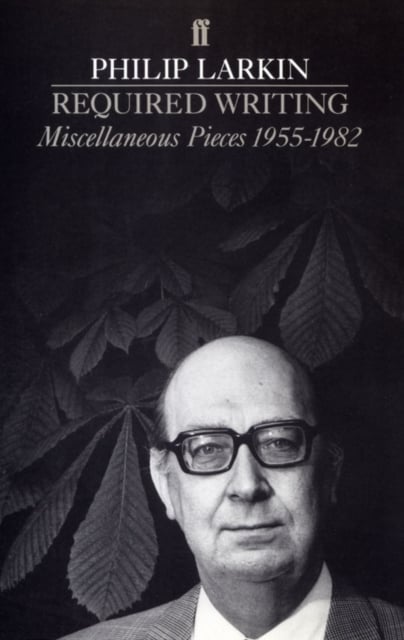
Although I wouldn’t have got on with the late Philip Larkin when it came to politics, nor with his selfish treatment of the women in his life, the person who comes across in his poems and letters seems, on the whole, an intelligent, thoughtful, likeable chap. So, when I saw this collection of his essays in an excellent second-hand bookshop in Carlisle, I snapped it up. It comprises mainly previously published opinion pieces, book introductions and reviews, with a few jazz-column articles thrown in at the end for bad measure.
In my limited experience, good poets also tend to be excellent prose writers. It’s a precision thing: precision and economy. Reading this excellent collection reinforced that view. Once again, Larkin comes across as a thoughtful, mostly likeable writer. He was less gloomy than his reputation, with a dry sense of humour. His opinions occasionally took me by surprise and made me question my own views—if, indeed, I’d ever considered such topics. This book was one of the most enjoyable new reads I’d had for a long time. (Apart from the handful of jazz pieces, obviously, which I wasted no compunction in skipping.)
Of particular interest to me were Larkin’s views on poetry readings by the poets themselves, either as live-readings or recordings. Although he made a small number of recordings himself, he was generally against them on the grounds that such readings would inevitably be seen as the definitive interpretations of the poems. He thought readers should be left to come up with their own interpretations:
Hearing a poem, as opposed to reading it on the page, means you miss so much—the shape, the punctuation, the italics, even knowing how far you are from the end. Reading it on the page means you can go your own pace, taking it in properly; hearing it means you’re dragged along at the speaker’s own rate, missing things, not taking it in, confusing ‘there’ and ‘their and things like that. And the speaker may interpose his own personality between you and the poem, for better or worse.
I was also intrigued to read Larkin’s thoughts on the accessibility of poetry:
For, leaving aside the question of their respective poetic statures, it was Eliot who gave the modernist poetic movement its charter in the sentence ‘Poets in our civilisation, as it exists at present, must be difficult,’ and it was Betjeman who was to bypass the whole light industry of critical exegesis that had grown up round this fatal phrase by demonstrating that a direct relation with the reading public could be established by anyone able to be moving and memorable.
This collection also contained a number of wonderfully phrased one-liners that gave me food for thought, and sometimes made me laugh out loud. For example:
- Being happy doesn’t provoke a poem.
- Deprivation is for me what daffodils were for Wordsworth.
- Until I grew up I thought I hated everybody, but when I grew up I realized it was just children I didn’t like.
- I count it as one of the great moments of my life when I first realized one could actually walk out of a theatre.
- Sometimes I think, Everything I’ve written has been done after a day’s work, in the evening: what would it have been like if I’d written it in the morning, after a night’s sleep?
- I often wonder if I was shy because I stammered, or vice versa.
- I remember saying once, I can’t understand these chaps who go round American universities explaining how they write poems: it’s like going round explaining how you sleep with your wife.
- I’ve never been much interested in other people’s poetry—one reason for writing, of course, is that no one’s written what you want to read.
- It is fatal to decide, intellectually, what good poetry is because you are then in honour bound to try to write it, instead of poems that only you can write.
- Henceforth the poems [in his collection The Whitsun Weddings] belong to their readers, who will in due course pass judgement by either forgetting or remembering them.
- when spoken poetry’s mentioned, all my antiquarian rage boils at the thought of the legions of pre-1928 tenors and sopranos we preserved when nobody thought to record, say, Hardy or Lawrence.
- [Stevie Smith] has also written a book about cats, which as far as |I am concerned casts a shadow over even the most illustrious name.
Required Writing is required reading.
- Buy this book from Bookshop.org (UK) and help tax-paying, independent bookshops.
- Buy this book from Amazon.co.uk
- Buy this book from Amazon.com

Leave a Reply